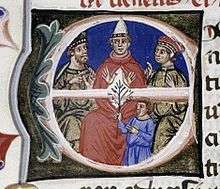1181
Year 1181 (MCLXXXI) was a common year starting on Thursday (link will display the full calendar) of the Julian calendar.
| Millennium: | 2nd millennium |
|---|---|
| Centuries: | |
| Decades: | |
| Years: |
| 1181 by topic |
|---|
| Leaders |
|
| Birth and death categories |
| Births – Deaths |
| Establishments and disestablishments categories |
| Establishments – Disestablishments |
| Art and literature |
| 1181 in poetry |
| Gregorian calendar | 1181 MCLXXXI |
| Ab urbe condita | 1934 |
| Armenian calendar | 630 ԹՎ ՈԼ |
| Assyrian calendar | 5931 |
| Balinese saka calendar | 1102–1103 |
| Bengali calendar | 588 |
| Berber calendar | 2131 |
| English Regnal year | 27 Hen. 2 – 28 Hen. 2 |
| Buddhist calendar | 1725 |
| Burmese calendar | 543 |
| Byzantine calendar | 6689–6690 |
| Chinese calendar | 庚子年 (Metal Rat) 3877 or 3817 — to — 辛丑年 (Metal Ox) 3878 or 3818 |
| Coptic calendar | 897–898 |
| Discordian calendar | 2347 |
| Ethiopian calendar | 1173–1174 |
| Hebrew calendar | 4941–4942 |
| Hindu calendars | |
| - Vikram Samvat | 1237–1238 |
| - Shaka Samvat | 1102–1103 |
| - Kali Yuga | 4281–4282 |
| Holocene calendar | 11181 |
| Igbo calendar | 181–182 |
| Iranian calendar | 559–560 |
| Islamic calendar | 576–577 |
| Japanese calendar | Jishō 5 / Yōwa 1 (養和元年) |
| Javanese calendar | 1088–1089 |
| Julian calendar | 1181 MCLXXXI |
| Korean calendar | 3514 |
| Minguo calendar | 731 before ROC 民前731年 |
| Nanakshahi calendar | −287 |
| Seleucid era | 1492/1493 AG |
| Thai solar calendar | 1723–1724 |
| Tibetan calendar | 阳金鼠年 (male Iron-Rat) 1307 or 926 or 154 — to — 阴金牛年 (female Iron-Ox) 1308 or 927 or 155 |
| Wikimedia Commons has media related to 1181. |
Events
Asia
Japan
- The Yowa era, marked by famine, begins in Japan.
Southeast Asia
- Jayavarman VII defeats the Cham and assumes control of the Khmer Kingdom.
Europe
- After a series of defeats, the Almohad navy, under the admiral Ahmad al-Siqilli, crushes the Portuguese fleet and reasserts its control over the Atlantic Ocean.[1]
- The word Albigensians is first used by chronicler Geoffroy du Breuil of Vigeois, to describe the inhabitants of Albi, France.
- Philip Augustus annuls all loans made by Jews to Christians, and takes a percentage for himself. A year later, he confiscates all Jewish property and expels the Jews from Paris.[2]
By topic
Science
- Chinese and Japanese astronomers observe what has since come to be understood as supernova SN 1181. One of only eight supernovae in the Milky Way observed in recorded history, it appears in the constellation Cassiopeia, and is visible in the night sky for about 185 days. The radio source 3C58 is thought to be the remnant from this event.
- Guilhem VIII, lord of Montpellier in France, frees the teaching of medicine from any monopoly. (January[3]).
Religion
- September 1 – Pope Lucius III succeeds Pope Alexander III, as the 171st pope.
Births
- Mathilde of Angoulême, French noble (d. 1233)
Deaths
- January 30 – Emperor Takakura of Japan (b. 1161)
- March 16 – Henry I, Count of Champagne
- March 21 – Taira no Kiyomori, Samurai leader of Japan (b. 1118)
- June 30 – Hugh de Kevelioc, 3rd Earl of Chester, English politician (b. 1147)
- August 30 – Pope Alexander III (b. c. 1100–1105)
- Adela of Meissen, queen consort of Denmark
- Lucas, Archbishop of Esztergom (b. c. 1120)[4]
- Taira no Kiyomori, Japanese warlord (b. 1118)
- As-Salih Ismail al-Malik, ruler of Syria (b. 1163)
References
- Picard, Christophe (1997). La mer et les musulmans d'Occident VIIIe-XIIIe siècle. Paris: Presses Universitaires de France.
- Baldwin, John (2006). Paris 1200. Paris: Aubier. p. 75.
- Mélanges d'histoire de la médecine hébraïque, by Gad Freudenthal, Samuel S. Kottek, Paul Fenton compiled by Gad Freudenthal, Samuel S. Kottek published by Brill, 2002 ISBN 90-04-12522-1, 9789004125223
- Makk, Ferenc (1994). "Lukács". In Kristó, Gyula; Engel, Pál; Makk, Ferenc (eds.). Korai magyar történeti lexikon (9–14. század) [Encyclopedia of the Early Hungarian History (9th–14th centuries)] (in Hungarian). Akadémiai Kiadó. pp. 417–420. ISBN 963-05-6722-9.CS1 maint: ref=harv (link)
This article is issued from Wikipedia. The text is licensed under Creative Commons - Attribution - Sharealike. Additional terms may apply for the media files.

